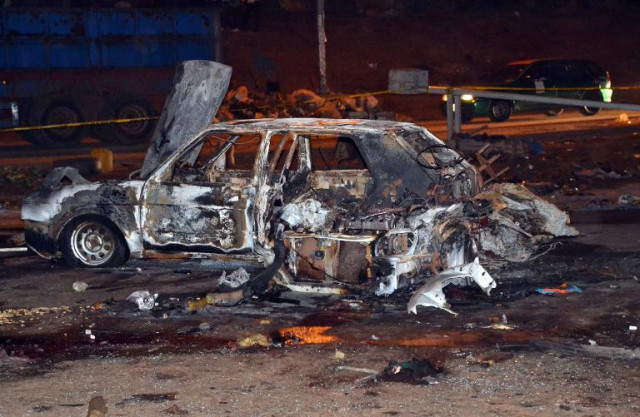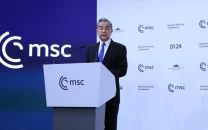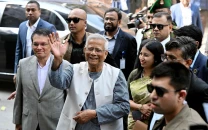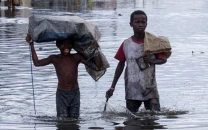Fear looms: Second blast in Nigeria's capital raises concern
Two deadly blasts within three weeks just a few kilometres from the seat of government have sparked security concerns.

Boko Haram, who have killed thousands in a five-year uprising, claimed responsibility for the previous bombing and were suspected of carrying out the latest attack. PHOTO: AFP
A car bomb at the Nyanya bus station on the outskirts of Abuja exploded late Thursday, just 50 metres (yards) from the site of an April 14 blast that killed 75 people, which was the deadliest attack ever in the city.
Boko Haram loyalists, who have reportedly killed thousands in a five-year uprising, claimed responsibility for the previous bombing and were suspected of carrying out the latest attack.
Two deadly blasts within three weeks just a few kilometres (miles) from the seat of government have sparked security concerns over the World Economic Forum on Africa, at which Chinese Premier Li Keqiang is due to attend.
The WEF said in a statement that its security arrangements for the conference, which is dubbed the "African Davos" and was due to be held at a top hotel in the city from May 7-9, were "robust".
"There are no plans to make any changes to the programme or content of the meeting," it added, offering sympathy for the victims.
Nigeria, however, announced that all government offices and schools would be shut during the conference, while local organisers have said more than 6,000 police and army personnel would be deployed to ensure delegates' safety.
"Our security planning for the World Economic Forum on Africa is already well under way and will be the largest security operation ever mounted in this country for an international summit," they said after the April 14 attack.
Boko Haram analyst Shehu Sani, who has written extensively on religious violence in Nigeria, said the twin Abuja bombings were intended "to send a clear message to the Nigerian government".
The loyalists wanted to demonstrate that "they can hit anytime and any place at their own choosing", Sani told AFP.
"They are trying to show how weak and incompetent the security forces are."
Police said the bomb, which according to eye-witnesses was left in a white Volkswagen car, killed 19 while National Emergency Management Agency (NEMA) spokesperson Manzo Ezekiel told AFP that 80 others were injured.
Three undetonated explosive devices were also discovered at the scene, police spokesman Frank Mba said, suggesting the toll could have been much higher had the other bombs exploded.
Much of Boko Haram's recent violence has targeted the remote northeast, the group's historic base, where more the 1,500 people have been killed already this year.
Before April 14, Abuja had not been significantly hit by Boko Haram for more than two years and Sani said the timing of the latest unrest may not have been coincidental.
"The insurgents had a long-term plan of attacking targets outside (the northeast)," he said.
"They may be taking the opportunity to show that even the World Economic Forum can be disrupted."
On Friday evening, US diplomats in Nigeria claimed in a revised security advisory for its citizens after the latest Abuja attack that "groups associated with terrorism" had planned to attack the Sheraton Hotel in Lagos.
Sheraton has two hotels in the city, which is Nigeria's financial capital: one in an upscale neighbourhood near the international airport and the other in the central commercial hub home to wealthier Nigerians and expatriates.
A second attack in Abuja three weeks just a few kilometres from the seat of government highlighted the serious threat Boko Haram poses to Africa's most populous country and largest economy.
President Goodluck Jonathan has faced intense criticism over the unrest, which has continued unchecked despite a massive year-long military offensive in the northeast aimed at crushing the uprising.
The bombing came amid mounting Nigerian and international outrage after one of Boko Haram's most shocking attacks -- the mass kidnapping of 276 girls from their school in the northeast.
Boko Haram, which says it wants to create a strict Islamic state in Nigeria's mainly Muslim north, has attacked schools, churches, mosques and other symbols of authority in an insurgency that has killed thousands since 2009.
But the last the four months have been the deadliest in the uprising, prompting questions about the effectiveness of the military strategy against the militants and piling pressure on President Goodluck Jonathan, who is expected to seek re-election next year.
Jonathan's administration on Friday held a top-level security meeting to discuss the latest bombing and how to rescue the 226 missing girls.
"The President assures Nigerians that 'wherever the girls are in the world, we will get them back, apprehend and punish the culprits'," information minister Labaran Maku said in an emailed statement.



















COMMENTS
Comments are moderated and generally will be posted if they are on-topic and not abusive.
For more information, please see our Comments FAQ